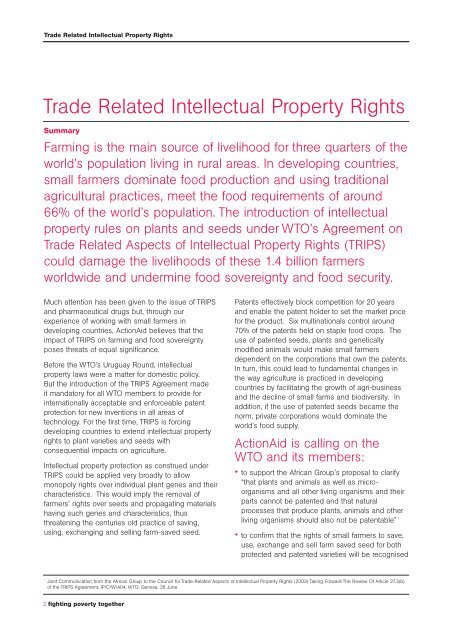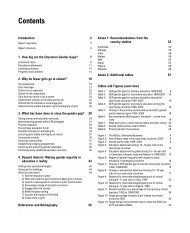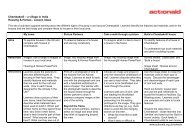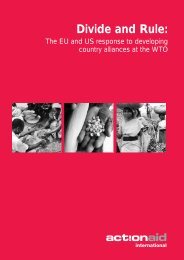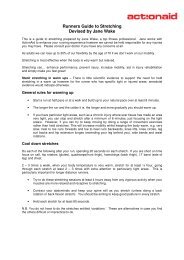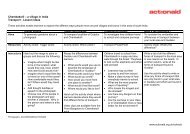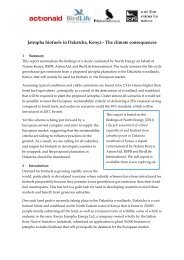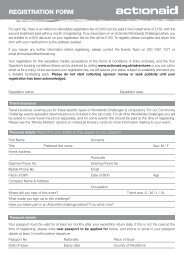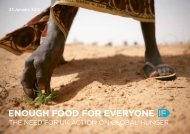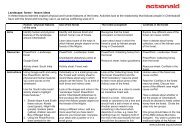<strong>Trade</strong> <strong>Related</strong> <strong>Intellectual</strong> <strong>Property</strong> <strong>Rights</strong><strong>Trade</strong> <strong>Related</strong> <strong>Intellectual</strong> <strong>Property</strong> <strong>Rights</strong>SummaryFarming is the main source of livelihood for three quarters of theworld’s population living in rural areas. In developing countries,small farmers dominate food production and using traditionalagricultural practices, meet the food requirements of around66% of the world’s population. The introduction of intellectualproperty rules on plants and seeds under WTO’s Agreement on<strong>Trade</strong> <strong>Related</strong> Aspects of <strong>Intellectual</strong> <strong>Property</strong> <strong>Rights</strong> (TRIPS)could damage the livelihoods of these 1.4 billion farmersworldwide and undermine food sovereignty and food security.Much attention has been given to the issue of TRIPSand pharmaceutical drugs but, through ourexperience of working with small farmers indeveloping countries, <strong>ActionAid</strong> believes that theimpact of TRIPS on farming and food sovereigntyposes threats of equal significance.Before the WTO’s Uruguay Round, intellectualproperty laws were a matter for domestic policy.But the introduction of the TRIPS Agreement madeit mandatory for all WTO members to provide forinternationally acceptable and enforceable patentprotection for new inventions in all areas oftechnology. For the first time, TRIPS is forcingdeveloping countries to extend intellectual propertyrights to plant varieties and seeds withconsequential impacts on agriculture.<strong>Intellectual</strong> property protection as construed underTRIPS could be applied very broadly to allowmonopoly rights over individual plant genes and theircharacteristics. This would imply the removal offarmers' rights over seeds and propagating materialshaving such genes and characteristics, thusthreatening the centuries old practice of saving,using, exchanging and selling farm-saved seed.Patents effectively block competition for 20 yearsand enable the patent holder to set the market pricefor the product. Six multinationals control around70% of the patents held on staple food crops. Theuse of patented seeds, plants and geneticallymodified animals would make small farmersdependent on the corporations that own the patents.In turn, this could lead to fundamental changes inthe way agriculture is practiced in developingcountries by facilitating the growth of agri-businessand the decline of small farms and biodiversity. Inaddition, if the use of patented seeds became thenorm, private corporations would dominate theworld’s food supply.<strong>ActionAid</strong> is calling on theWTO and its members:• to support the African Group's proposal to clarify“that plants and animals as well as microorganismsand all other living organisms and theirparts cannot be patented and that naturalprocesses that produce plants, animals and otherliving organisms should also not be patentable” 1• to confirm that the rights of small farmers to save,use, exchange and sell farm saved seed for bothprotected and patented varieties will be recognised1Joint Communication from the African Group to the Council for <strong>Trade</strong>-<strong>Related</strong> Aspects of <strong>Intellectual</strong> <strong>Property</strong> <strong>Rights</strong> (2003) Taking Forward The Review Of Article 27.3(b)of the TRIPS Agreement, IP/C/W/404, WTO, Geneva, 26 June2 fighting poverty together
www.actionaid.organd respected, consistent with Article 27.3(b) andwith Article 30 2 of the TRIPS Agreement• to ensure that WTO TRIPS Agreement is consistentwith provisions of the Convention on BiologicalDiversity as well as the International Treaty on PlantGenetic Resources for Food and Agriculturerelating to the conservation and sustainable use ofgenetic resources and ensure prior informedconsent and benefit sharing.Food security under threatIncreased costs for small farmers:royalties, input costs and indebtednessThe royalty payments, restrictive contracts andincreased commercialisation associated with seedsprotected by intellectual property mean they costsignificantly more than traditional or hybrid seeds.Farmers in India have witnessed the impact ofincreased costs in relation to Monsanto’s Bt cottonseeds. Farmers in Nalgonda district of AndhraPradesh in India paid up to 1600 rupees for a 450-gram packet of Bt cotton seeds, (of which the royaltycomponent was 1200 rupees 3 ), as against 450-500rupees for normal varieties. Despite the costs, Btcotton yields have sometimes been lower than thoseof local varieties. 4New patented seeds, especially genetically modifiedseeds, are often designed for use with specificpesticides, herbicides or other agro-chemicalsproduced by the same company. The high costs ofthese inputs places additional burdens on smallfarmers and can lead to increased levels ofindebtedness.A study of Bt cotton in Andhra Pradeshdemonstrated that farmers who cultivated Bt cottonspent 15% of the total cost of cultivation on theseed, as against 5% in case of non Bt farmers.However, hopes of reduced pesticide requirementsand higher yields were not realised. In the year theresearch was carried out, those farmers using BtCotton seeds experienced an average net loss of1295 rupees per acre while those using moretraditional varieties earned an average profit of 5368The high costs and dubiousbenefits of implementing TRIPSWorld Bank economists have pointed out thatthe costs to developing countries ofimplementing the TRIPS Agreement areunreasonably high. Mexico spent over US$30million upgrading intellectual property lawsand enforcement despite starting from ahigher level of implementation than is in placein most least developed countries. 6 The WorldBank estimates that the total losses arisingfrom implementing TRIPS would be as high as10.1% of South Korea’s GDP, 1.4% of China’sGDP and 0.6% of India’s GDP. 7 The hugedirect costs of implementing the TRIPSAgreement, the benefits from which initially willaccrue only to foreign businesses, divertlimited resources away from developmentpriorities like agriculture, health and education.According to Professor Keith Maskus 8 , thedomestic benefits of implementing TRIPS areunlikely to be realised before a countryachieves a level of development representedby an average per capita income of aroundUS$7,750 (in 1985 prices).rupees per acre. 5 fighting poverty together 32Article 30 states that “Members may provide limited exceptions to the exclusive rights conferred by a patent, provided that such exceptions do not unreasonablyconflict with a normal exploitation of the patent and so not unreasonably prejudice the legitimate interests of the patent owner, taking account of the legitimate interestsof third parties.”3http://members.tripod.com/~ngin/191202b.htm4http://www.hinduonnet.com/thehindu/2003/01/26/stories/2003012601690500.htm http://www.hinduonnet.com/thehindu/2003/01/26/stories/2003012601690500.htm5Qayum, M. & Kiran, S. (2003) Did Bt Cotton Save Farmers in Warangal, Andhra Pradesh Coalition in Defence of Diversity, India6Finger, J.M. (World Bank) and Schuler, P. (University Of Maryland), (1999), Implementation of Uruguay Road Commitments: The Development Challenge, paper forWTO/World Bank Conference on ‘Developing Countries In A Millennium Round’, Geneva, September7World Bank (2002), Global Economic Prospects and Developing Countries, quoted in http://www.cepr.net/relative_impact_of_trade_liberal.htm8Maskus, K. (2000a) “<strong>Intellectual</strong> <strong>Property</strong> <strong>Rights</strong> in the Global Economy”, Institute for International Economics, Washington DC, pp.73-79.


